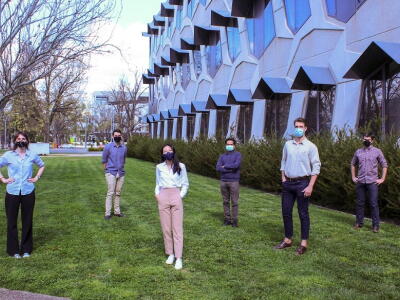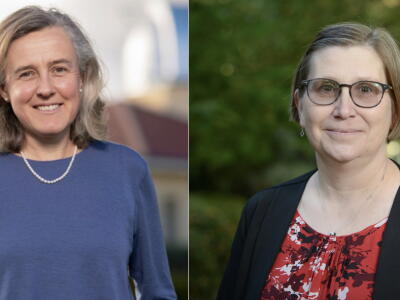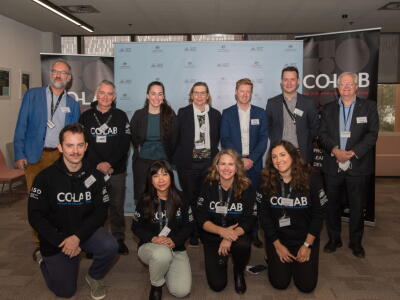ANU researchers win Gordon Bell Prize for record-breaking algorithm
By: ANU College of Engineering, Computing & Cybernetics
Posted on
A team of researchers from The Australian National University (ANU) has been awarded the 2024 Gordon Bell Prize for a record-breaking algorithm that advances our understanding of chemistry and biology.
The award is the peak accomplishment acknowledging outstanding achievement in high-performance computing, and was presented at the Association for Computing Machinery’s International Conference for High-Performance Computing, Networking, Storage and Analysis (SC24) in Atlanta, Georgia.
The eight-member winning team hails from Australian and American institutions: ANU PhD students Ryan Stocks, Jorge Vallejo, Fiona Yu, Calum Snowdon, and Elise Palethorpe; Giuseppe Barca (QDX Technologies, ANU and University of Melbourne); and collaborators Jakub Kurzak (Advanced Micro Devices, Inc.) and Dmytro Bykov (Oak Ridge National Laboratory).
The team’s research focuses on molecular dynamics—a computer simulation method that helps us to better understand the movements of atoms, molecules, and how they interact. This modelling can lead to technological leaps in renewable energy, medicine, and advanced manufacturing.
Using their innovative algorithm on a powerful supercomputer, Frontier, the prize-winning team was able to achieve a record-breaking simulation of more than one million electrons for a computational chemistry application.
Their paper, Breaking the Million-Electron and 1 EFLOP/s Barriers: Biomolecular-Scale Ab Initio Molecular Dynamics Using MP2 Potentials, explains:
“This leap forward is not merely incremental; it redefines the boundaries of what is computationally feasible in molecular dynamics, setting a new benchmark for accuracy and efficiency in large-scale simulations. The enhanced scalability and accuracy of our simulation techniques empowers the scientific community to tackle longstanding challenges in both chemistry and biology.”
ANU School of Computing Director, Professor Antony Hosking, congratulated the team on the achievement.
“The ANU School of Computing prides itself on innovating at the frontiers of computing and delivering deep technical and scientific outcomes using computation and the immense capabilities of today’s and tomorrow’s computing platforms. This outcome reflects that commitment for the nation and the world,” said Professor Hosking.
This latest accolade for ANU builds on the university’s standing as a global leader in innovation and research. This is the second time that ANU researchers have been recognised with the Gordon Bell Prize. In 2000, ANU researchers Bob Edwards, Jon Baxter, and Doug Aberdeen won in the price/performance category for their work on 92 cents/Mflops Ultra-Large Scale Neural-Network Training on a PIII Cluster.
ANU graduate Dr Zubair Khalid was also part of the team that won the 2024 Gordon Bell Prize for Climate Modelling. Dr Khalid was among the researchers recognised in this category for developing a climate emulator that leverages AI and high-performance computing to enhance the accuracy and efficiency of climate modelling.
This article first appeared at ANU College of Engineering, Computing & Cybernetics.
You may also like
Plastic chomping company takes out top sustainability award
An ANU-backed start up that is turning the tide on the wave of plastic pollution flooding our planet has taken out a top prize in one of Australia's major sustainability awards.
Galactic gains and mighty grains earn ANU stars top accolade
A leading astrophysicist uncovering the deep inner secrets of the Milky Way and a renowned plant scientist tackling one of the greatest challenges facing the agriculture industry have both been newly…
Co-Lab celebrates its Honours Grant recipients
One of the keystone partnerships at ANU, the Co-Lab, has welcomed and celebrated its inaugural cohort of 2022 Co-Lab Honours Grant recipients.


